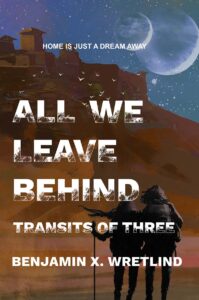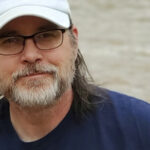 Novelist Benjamin X. Wretlind joins me today to chat about his new anthropological sci-fi, All We Leave Behind: Transits of Three.
Novelist Benjamin X. Wretlind joins me today to chat about his new anthropological sci-fi, All We Leave Behind: Transits of Three.
During his virtual book tour, Benjamin will be giving away a $25 Amazon or Barnes and Noble (winner’s choice) gift card to a lucky randomly drawn winner. To be entered for a chance to win, use the form below. To increase your chances of winning, feel free to visit his other tour stops and enter there, too!
Bio:
Benjamin X. Wretlind is a speculative fiction author who writes science fiction, dark fantasy, magical realism, and some horror. He has been–at different times, of course–a fry cook, range boy, greens maintenance technician, reservations agent, room service attendant, editor, banquet server, meteorologist, instructor, program manager for Internet applications, curriculum developer, training simulation engineer, leadership facilitator/coach, process improvement consultant, learning manager and organizational psychologist. He currently builds and facilitates leadership courses at Yale.
Benjamin has penned a few novels, deleted a few novels, edited a few novels and is, of course, writing a few novels…mostly about things. Owing his life’s viewpoint to Bob Ross, he has also painted a few things, thrown a few paintings away, and probably has a painting on an easel right now. Oh, and he loves wood working, too.
It’s all about creating.
Benjamin lives with his wife Jesse in Colorado.
Welcome, Benjamin. Please tell us about your current release.
All We Leave Behind: Transits of Three is the third novel in the Transit series and follows roughly a few weeks after the events in the second novel. The Transit series is a journey in nine parts (books) to be released through 2028. Although the series could be considered anthropological sci-fi, it is not an examination of human life through an anthropologist’s eyes but an examination of the evolution (or devolution) of the sociology of the species if the starting point were now.
My point in writing this book and the others is to answer the singular question: Would humanity’s sociological past follow the same general paths if it had a chance to start over?
This particular novel explores a group of colonists who must find a new home, yet no one really agrees one where to go. The main theme is about how societies split–diaspora–either because of external forces or–more often–because of internal issues.
What inspired you to write this book?
I have been a fan of generational book series for decades, starting with Isaac Asimov’s Foundation. I don’t always believe that series must follow in close order. I was ultimately inspired by the state of the world and a conversation with my wife about starting over. What if we, as a society, could go back in time and do things differently? Would human nature still have put us on the path we’re on now? Since we can’t go back in time, I decided to take a different approach: what if a group of people could start a society over on a new planet with a clean slate? What would happen then?
Excerpt from All We Leave Behind: Transits of Three:
Patience tried to count the number of people left in the temple at Manoach. Three hundred, three hundred fifty? Many of those had already revealed their desire to follow Joel when he returned from the Barrier Mountains. There might be a few more or less, but her calculations sounded right given the number of people who followed Miriam to the west. Of those not going with Joel, maybe a handful would be willing to pack up and leave Manoach.
Would Micah be one of them?
A cry of alarm rose from a scout to Patience’s right. She looked over and saw Theresa Atkins, a woman slightly older than Patience, wave a lit torch indicating a potential threat. Patience looked out beyond the wall and tried to focus her eyes on several shapes she saw moving out of the tree line. At first, there were three. Then four.
Now seven.
“Lord, help us,” she whispered.
Another alarm rose to her left. Levi Barrett, one of the newest scouts Patience had been training and still only fifteen, waved his torch back and forth. Fearing the worst, Patience looked out toward the tree line in front of his part of the wall.
Nine.
Fifteen.
Fifteen rychat, approaching from two directions, silhouettes in the dark creeping through the brush.
What exciting story are you working on next?
Currently I’m finishing up the first book in a new series while getting things ready to write the fourth Transit. The new series is a lighter look at what happens when an inmate on a prison mining rig on a completely waterlogged planet gets the opportunity to go fishing.
 When did you first consider yourself a writer?
When did you first consider yourself a writer?
I’ve considered myself a writer for most of my life, although if I had to pinpoint a time I would say (ambiguously) sometime in my teens. That was the point when I finally decided this is what I wanted to do with my life. I started writing stories outside of what had been assigned to me in high school and then studied the craft. When I finally published my first book, I was almost 40.
Do you write full-time? If so, what’s your work day like? If not, what do you do other than write and how do you find time to write?
I write from 4:30 in the morning to about 6:30 when I get ready for work. I also write on the weekends and when I have a free moment. I currently build and facilitate leadership and professional development courses for Yale, but since it’s remote I don’t have much of a commute. It has been a pure blessing to have this job which gives me the time I need to hammer out a few thousand words a day.
What would you say is your interesting writing quirk?
I use the Hemingway technique. By stopping when I know what will happen next, I can meditate on it for the rest of the day, sometimes overnight. When I wake up, I can jump right in to where I was with much more vigor than I could have if I had to stare at a blank page. As an example, this morning I finished about 3,000 words and stopped on a new chapter with the following:
“My heart sank in my chest, and yet it quickly fell…”
Tomorrow, I’ll finish that sentence (with a few tweaks) and keep going.
As a child, what did you want to be when you grew up?
A vet, an aeronautical engineer, an architect, and a writer. When I realized that math wasn’t my thing and I can’t draw a building that doesn’t look like a square, I decided I would be a writer. That probably doesn’t explain why my first real job was as a meteorologist.
Anything additional you want to share with the readers?
I’m always excited to talk about writing, whether it’s what I’m up to or what you’re up to. I have a blog where I write some writerly stuff, often about weather and writing (since I was embedded in that world for over twenty years) or psychology and writing (since those are what my degrees are in).
Links:
Website | Facebook | Twitter | Instagram | Goodreads | Bookbub | Amazon


Thanks for hosting!
Thank you for hosting me on this tour!
Thank you for sharing your interview, bio and book details, the Transits of Three series sounds like a must read for me and I am glad that a fourth book is in the works. The new series that you’re working on sounds interesting to me as well and I will be keeping a look out for the release of the first story
Sounds like a very good book.
Interesting author interview!! I enjoyed reading it and learning more about this book and the author!!
I like the book cover!! Very intriguing and mysterious!!